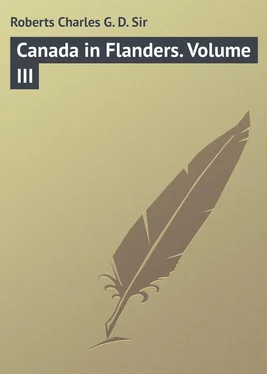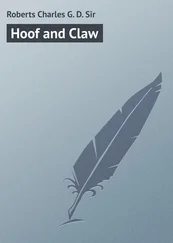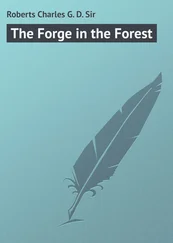Charles Roberts - Canada in Flanders. Volume III
Здесь есть возможность читать онлайн «Charles Roberts - Canada in Flanders. Volume III» — ознакомительный отрывок электронной книги совершенно бесплатно, а после прочтения отрывка купить полную версию. В некоторых случаях можно слушать аудио, скачать через торрент в формате fb2 и присутствует краткое содержание. Жанр: foreign_prose, foreign_language, на английском языке. Описание произведения, (предисловие) а так же отзывы посетителей доступны на портале библиотеки ЛибКат.
- Название:Canada in Flanders. Volume III
- Автор:
- Жанр:
- Год:неизвестен
- ISBN:нет данных
- Рейтинг книги:3 / 5. Голосов: 1
-
Избранное:Добавить в избранное
- Отзывы:
-
Ваша оценка:
- 60
- 1
- 2
- 3
- 4
- 5
Canada in Flanders. Volume III: краткое содержание, описание и аннотация
Предлагаем к чтению аннотацию, описание, краткое содержание или предисловие (зависит от того, что написал сам автор книги «Canada in Flanders. Volume III»). Если вы не нашли необходимую информацию о книге — напишите в комментариях, мы постараемся отыскать её.
Canada in Flanders. Volume III — читать онлайн ознакомительный отрывок
Ниже представлен текст книги, разбитый по страницам. Система сохранения места последней прочитанной страницы, позволяет с удобством читать онлайн бесплатно книгу «Canada in Flanders. Volume III», без необходимости каждый раз заново искать на чём Вы остановились. Поставьте закладку, и сможете в любой момент перейти на страницу, на которой закончили чтение.
Интервал:
Закладка:
Dominion Day (July 1st) was celebrated by the 26th (New Brunswick) Battalion in a manner little appreciated by the grey ranks across the way. Supported by the fire of our artillery and trench-mortars, two officers and twenty-five other ranks operated against a convenient point in the German front-line trench. The assaulting party were observed and subjected to a brisk but inaccurate fire of machine-guns and rifles before they had passed the enemy's inner wire. They pressed forward without a pause and rushed the parapet. The garrison of the trench immediately retired from this threatened point except for three men, who stuck to their loopholes and continued firing. Lieutenant Fleming accounted for one of these by thrusting his revolver into a loophole and returning the fire. The trench was then entered and its remaining defenders disposed of. After our party had investigated about forty yards of the trench they were driven out by a heavy bombardment of rifle-grenades and mortar-bombs. They then returned to our own lines with a few slight casualties, some useful information, and a quantity of German equipment.
An encounter in No Man's Land between a patrol of the 22nd (French Canadian) Battalion and a German patrol on the night of July 4th resulted in the dispersion of the enemy and our capture of two prisoners.
Ten nights later a reconnoitring patrol from the 25th (Nova Scotia) Battalion attacked an enemy listening-post at the moment of its being strongly reinforced. After a brisk exchange of grenades the Germans ran for their trench, leaving the field and one of their wounded to us.
On the night of the 25th a large German mine was blown in our lines on the Bluff. This was not the enemy's first attempt to possess himself of that advantageous position. It will be remembered that he attained his object in January of the same year and was not driven out until a month later, and then only at a heavy cost of killed and wounded. Fortunately the second attempt to secure a foothold on that ground failed utterly, thanks to the alertness and prompt action of our troops immediately concerned. Briefly, the story of the foiled effort is this: —
The 1st Canadian Division, which had taken over the Bluff sector on the 22nd of the month, received warning two days later from Major North, of the 1st Canadian Tunnelling Company, that the enemy might be depended upon to blow a mine very soon somewhere in the vicinity. The localities which were considered with the liveliest suspicion were a point known as the Bean and Trench 33. The Division immediately warned the 2nd Infantry Brigade of the menace; the G.O.C. the Brigade ordered reductions in the garrisons of the threatened positions, the covering of that section of front by machine-guns, and the detailing of parties for counter-attack and of other parties for the vital work of consolidation should a mine be blown.
The early hours of the night of the 25th were unusually quiet about the Bluff. Artillery was silent. Snipers and machine-gunners seemed half-hearted in their activities. The 7th (British Columbia) Battalion was engaged in preparing for a relief which was to be completed by midnight.
At ten o'clock the quiet was shattered by a tremendous convulsion. Earth, fire, rock, and smoke belched to heaven. Trenches vanished, engulfed. Instantly the S.O.S. rocket went up. Our machine-guns responded like crackling echoes of the explosion.
Within thirty seconds of the rocket-signal for help the guns of Dodd's Group commenced a crushing bombardment of the German positions which threatened the new crater. Our counter-attacking parties advanced, armed with rifles, grenades, and machine-guns. They occupied the forward lip of the crater, the flanking shell-holes overlooking its raw depths, certain points commanding the canal, and a ridge running between an historic old crater and the new.
The Germans, reinforced and ready for the dash from cover and the occupation of the Crater swarmed to their parapets, and swayed and seethed there for a little while like a headed wave about to break and flood forward. Then the wave broke and subsided – backward instead of forward.
The great attack was dead, dead in the first half-minute of its furious and painful life, killed by the smashing fire of our artillery and the whipping hail of our machine-guns.
Within one and a half hours of the blowing of the mine the O.C. the 7th Battalion reported to his Brigadier that the menace was past, and that the new crater was being swiftly absorbed by our defensive positions. Our artillery reduced its fire by one-half. Five minutes later the German artillery retaliation ceased, the fire of our machine-guns and artillery dropped to normal, and the relief of our infantry – which had been interrupted and delayed for nearly two hours – was calmly continued.
Owing to the precaution of thinning the garrisons in the threatened locality, our casualties were wonderfully light – less than fifty all told in killed, wounded, and missing. It is safe to say that the enemy casualties, caused by our artillery, machine-guns, Stokes and trench-mortar batteries, were much heavier; and, in addition to their loss of life and limb, the Germans lost their adventure. The months of toil devoted to the laying of the mine and the tons of explosive which comprised it failed to strengthen their position by a tittle or to weaken ours by a jot.
On the night of the 28th a patrol from the Nova Scotian Battalion (25th), consisting of a lieutenant, a sergeant, and four men, carried out a daring raid on a small scale. They bombed the German trench at the point where they intended to enter, and were about to negotiate the parapet when a party of eight enemy bombers attacked them on the flank. In the brief but desperate fight which followed this unexpected distraction three of the Canadians were wounded and the eight Germans were disposed of. Lieutenant Wise, with Sergeant Anderson and Private Johnson, then entered the hostile trench and discovered that their preliminary grenade-fire had killed five of the garrison. They drove the enemy down the trench, until Anderson was wounded. Lieutenant Wise ceased his offensive to help the sergeant over the parapet, and while thus engaged he received three wounds. Johnson continued to drive the enemy until all his grenades were thrown. He then escaped from the trench, returned to our lines, collected a rescue party, and led the way back to the scene of action. All our wounded were found and brought in with the exception of Sergeant Anderson.
At half-past eight on the morning of the 29th the 19th (Ontario) Battalion made a daylight raid into the enemy trenches on the St. Eloi front between Ruined Farm and the Canal. Two officers and the scouts of the Battalion had devoted every day and night of the preceding week to reconnoitring the ground over which the attack was to be made. During the night of the 28th the enemy's wire in front of the point selected for entry was hand-cut by two men of the Battalion. Machine-gun fire on the hostile parapet at the threatened point muffled the sound of the clipping of the wire. The raiding party, consisting of Captain C. L. Kilmer Lieutenant H. B. Pepler, and eighteen N.C.O.'s and men, covered three-quarters of their journey between the lines by way of an old ditch, doubled across the remaining forty-five yards, passed through the gaps in the wire, and went over the parapet before they were discovered by the enemy. They moved to the right and left along the trench, shooting and bombing. Upon the approach of strong German reinforcements along a communication trench, the signal to retire was given and successfully obeyed. During the evacuation of the trench the raiders suffered a few slight casualties from grenade-fire, and the two officers and a sergeant sustained shrapnel wounds. Captain Kilmer was the last to leave the trench. One of his ankles had been broken in the fight. As he was unable to reach our lines unassisted, and unwilling to delay the retirement, he crawled into a shell-hole situated about eight yards in front of the German wire. He was rescued from this insecure retreat by Lieutenant Burnham, Corporal Wilson, and Private Newton, who, covered by an accurate barrage from the guns of Stewart's Group, moved out to the shell-hole and back to our lines under a heavy fire of machine-guns and rifles.
Читать дальшеИнтервал:
Закладка:
Похожие книги на «Canada in Flanders. Volume III»
Представляем Вашему вниманию похожие книги на «Canada in Flanders. Volume III» списком для выбора. Мы отобрали схожую по названию и смыслу литературу в надежде предоставить читателям больше вариантов отыскать новые, интересные, ещё непрочитанные произведения.
Обсуждение, отзывы о книге «Canada in Flanders. Volume III» и просто собственные мнения читателей. Оставьте ваши комментарии, напишите, что Вы думаете о произведении, его смысле или главных героях. Укажите что конкретно понравилось, а что нет, и почему Вы так считаете.












